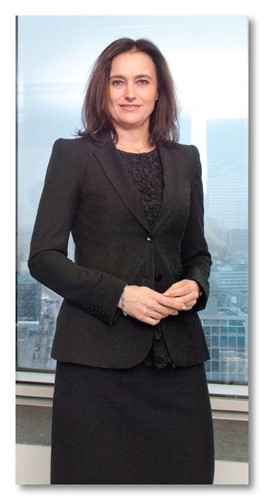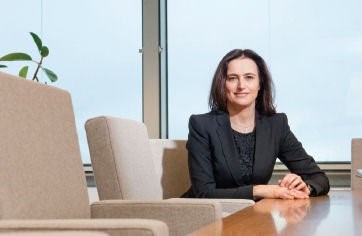
GAME, SET, MATCH
The journey from the tennis court to Rotterdam’s Robeco Group is a long and winding road. For Véronique Schyns, it was just a matter of acing her serve. Andrew Thomas speaks with her
Photographs by Rob Marinissen
 A mixture of crippling insecurity and youthful recklessness defines most teenage years, as decisions are postponed and focus unnecessary. For Véronique Schyns, head of corporate communications for Robeco Group, her moment of clarity came early. Finding herself, aged 11, as the unseeded young girl in her first national tennis finals, she was rigid with nerves. Her confidence, strong enough to have taken her so far in the tournament, abandoned her. Unable to fully focus, she even forgot to take off her jumper for the game. “I couldn’t believe I could win the match, or even lose gracefully,” she recalls. She lost most points, the two sets over quickly.
A mixture of crippling insecurity and youthful recklessness defines most teenage years, as decisions are postponed and focus unnecessary. For Véronique Schyns, head of corporate communications for Robeco Group, her moment of clarity came early. Finding herself, aged 11, as the unseeded young girl in her first national tennis finals, she was rigid with nerves. Her confidence, strong enough to have taken her so far in the tournament, abandoned her. Unable to fully focus, she even forgot to take off her jumper for the game. “I couldn’t believe I could win the match, or even lose gracefully,” she recalls. She lost most points, the two sets over quickly.
For most, tennis would have been forgotten, the raquet put away for the occasional holiday games. Véronique, however, headed home determined to overcome her fear. She gave up childhood pursuits, quit her ballet classes and entered the world of tennis. “That first final taught me there is no match won without a fight.” For the next 11 years, tennis was her life.
It’s clear that Véronique’s teenage years as a semi-pro tennis player remain dear to her. She refers to this time often, and tennis analogies and metaphors pepper her conversation. But the importance of these years are equally in the single-mindedness she has dedicated to her career. A career that has seen her skills develop with ABN Amro and Rabobank, two of the world’s largest financial services firms, and Heineken the world’s third largest brewer. The latter during a time of phenomenal change and M&A activity.
Véronique was raised in the southern region of Limburg in the Netherlands, in a household where tennis was the thread that bound the family together. As the youngest of five she was the last great hope for her tennis-obsessed father who, after that first disastrous final, saw her progress through the ranks to become one of the Netherlands’ top female tennis players.
But it wasn’t easy. There was no national formal tennis programme, and the scholarship system that would produce international players like Kiki Bertens and Robin Haarse had only yet to be introduced. “It was extremely hard, a struggle to do your school and then your tennis,” says Schyns. The year she reached the European championship the strains of tennis life were already beginning to show and she was required to repeat the school year.
She began to realise how much harder it would be to stay at the top, and one morning, during a tennis tournament in Waco, USA, she woke with the immediate resolve to stop playing tennis. “I already knew I wanted to finish college and I knew it would be more important to equip myself for a decent job later on than to get to 25 and find I had no options than to become a tennis trainer.”
With high ambitions for his youngest girl, it took her tennis-loving father a long time to understand that decision, and to see them not as wasted years but as a period of investment in his daughter’s development. “It was a very important part of my life. It was my education. All the skills I learnt during that time still help me today,” says Schyns. “Maybe I could have been better, but I was happy with my decision.”
She threw herself into her studies, developing her language skills, which had developed both during her time on the international tennis circuit and her upbringing in the Netherlands’ southern region, where Limburgish and not Dutch is spoken. She took Spanish at Utrecht University, benefiting from the introduction of a vocational year. This, Véronique spent working for a translation agency, and, upon graduating in a time of high unemployment she took up a full-time position there. It was at the translation agency that her on court focus developed in her business life. “I soon realised I couldn’t build a career on just speaking a language and persuaded my manager to create an account manager role for me.”
In this new role, Véronique began to develop her commercial understanding which, four years later, she took to electronics giant Amphenol. After a stint as sales manager for Spain and Portugal she persuaded her manager to create the role of marketing communications manager. From here she moved to ABN Amro.
Although she continued in a marketing communications role, she was already beginning to focus on corporate communications. “Already I knew that I wanted to communicate strategy, and I thought I could contribute. But I didn’t know how difficult it would be,” she says.
Without the right background Véronique found it hard to progress. But then her big break came along. “At ABN I had a manager who believed in me – who was willing to give me chance.” Employing the same technique as she had earlier in her career, Véronique went to the head of the press office and persuaded him to hire her in the role of spokesman in their division.
From there her love affair with corporate communications began. “I’m so passionate about it. I think so many companies don’t know what comms can help them achieve. I was lucky to work with someone who did.”
Sadly, though, that working relationship was not to last. “The person that believed in me left. I had greater ambitions and my new manager stifled this.” It was time to leave. She looked, and found Rabobank. A company prepared to give her more opportunities.
In many organisations the credibility you are given is decided from the outset, and it is often hard to achieve greater gravitas. At ABN Amro, Schyns felt that she had not been taken seriously enough. Moving to Rabobank however was her coming-of-age. “I was ready for the role,” she says, “In order to flourish you need to grow out of the junior position the sooner the better, if you’re up to it, that is, and I showed Rabobank that I was.”
Véronique blossomed. At Rabobank she was the advisor, the senior press officer interacting with a board. “It was a very professional communications department. The whole integration of internal and external communications were done very well, and I really liked that.” Schyns loved her time at Rabobank, and would have been happy to have stayed much longer. But, again, the head hunters called. This time from Heineken, the world’s third largest brewery and one of the Netherlands highest profile companies. It was an opportunity she couldn’t turn down. However, the job she went to do was different from the job she ended up doing.
“I wanted to experience a marketing driven FMCG role. But when I got got there the job almost instantly changed. Already on day two I was talking to the press about an acquisition.” In her first two years Véronique had already worked on dozens of mergers and acquisitions. She loved it. Heineken gave her the responsibility and the objectives – but she decided on the strategy to achieve it. “I looked to see who I could team up with. The IR team were professional and friendly, and we both ended up shaping the storyline, working really closely together. In fact sometimes it felt like I was working for their department rather than for comms”.
For a media handler, acquisitions are demanding times. Jan Van der Merbel, her counterpart on the IR team, and still a good friend, summed it up during the Scottish & Newcastle takeover. ”The shareholders complained we were paying too much, Scottish & Newcastle thought we were paying too little, everyone said we didn’t communicate enough, and the UK Takeover Panel thought we’d communicated too much!” he says.
This indeed was high level strategic communications and Véronique Schyns was loving it. And Heineken were loving her. After two years she was made global head of media.
However, for all her reminiscences of the M&A battles won, Véronique underplays the insecurity of that time at Heineken. There was a new CEO, keen to build a new team, and the reorganisation was taking its toll. With hindsight, Véronique feels she survived, and grew, for two reasons: her growing M&A experience certainly helped her hang on, but she also felt her tennis played a large part. “Somehow I found the confidence to do these things. I really believe that if I start something I have to completely focus on it, and much of that discipline is down to my tennis days.”
It was during that time at Heineken that she started to drive the comms strategy, initiating a different way of communicating, one that involved more storytelling and a different means of measuring success. With a greater focus on strategy, she also developed a more long term approach. “We started a very proactive media campaign, and you don’t do that in one year. We were consistently building relations with the media, consistently building the storyline and consistently positioning our senior executives, particularly our new CEO,” says Schyns.
|
Curriculum Vitae: Véronique Schyns2011- present SVP of corporate communications, Robeco Group |
It was gruelling. “Planning was vital, because during this period the work took over. With so many acquisitions it was constant but at the same time I broadened my experience.” Having already developed an understanding for IR and financial PR she now started integrating brand PR into her storytelling. “It was wonderful to talk to the financial community about the brand,” she says. “I know the dilemma about where corporate brand responsibility should sit and I do think it should be within corporate communications.”
But with growth comes change. With expansion comes reorganisation. The 2010 acquisition of Mexican brewing giant FEMSA Cerveza saw a large increase in the size of Heineken, and Véronique felt her responsibility lessen.
Many of her peers had left to start their own businesses, and Véronique felt she was now ready for this challenge.However, with a self-effacing smile Véronique happily laughs this experience off. “To be honest I didn’t succeed. I did some nice projects but it was definitely not a living and definitely not my thing.”
“I realised it wasn’t going to work and quite quickly I felt I was ready for a director’s role in corporate communications.” Fortunately for Véronique the headhunters once again called and Robeco Group, a Dutch asset management firm, appointed her SVP and head of corporate communications. It was the perfect role for Véronique. As with her previous employers, Robeco is well respected and well known in the Netherlands. That reputation and sense of credibility is important to her.
The challenges are different, not just in the nature of the organisation, but because times are changing. “Content has become more important, and comms has assumed the responsibility for that. Organisations have moved away from advertising, with communication professionals having responsibility for both earnt and paid.”
Véronique finds she’s working even harder than during her time at Heineken. Whilst Robeco is a household name in the Netherlands, it’s less well known abroad. “Brand management is challenging. It isn’t easy to get the attention of international journalists more interested in covering brands like Heineken.”
She has recreated her proactive media plan from her Heineken years, but she has others running it for her “I’ve grown, I can’t wear two hats any more – you can’t get into the details anymore.” Véronique is a top-seeded professional, confident to take command of the court of communications. “I don’t tolerate second-best,” she says. “Sometimes there are times to reprioritise – if we can’t reach our goals we will change the strategy. Otherwise it takes time away from the projects that can be achieved; from the games that can be won.”




